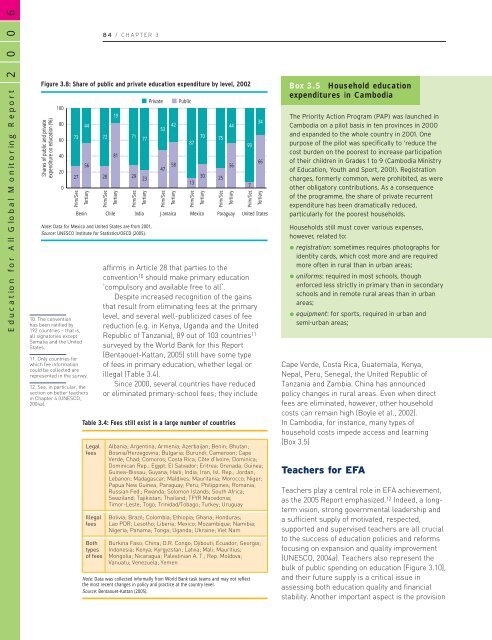literacy for life; EFA global monitoring report, 2006 - Institut de ...
literacy for life; EFA global monitoring report, 2006 - Institut de ...
literacy for life; EFA global monitoring report, 2006 - Institut de ...
Create successful ePaper yourself
Turn your PDF publications into a flip-book with our unique Google optimized e-Paper software.
0<br />
6<br />
0<br />
84 / CHAPTER 3<br />
2<br />
Education <strong>for</strong> All Global Monitoring Report<br />
Figure 3.8: Share of public and private education expenditure by level, 2002<br />
Shares of public and private<br />
expenditure on education (%)<br />
100<br />
80<br />
60<br />
40<br />
20<br />
10. The convention<br />
has been ratified by<br />
192 countries – that is,<br />
all signatories except<br />
Somalia and the United<br />
States.<br />
44<br />
11. Only countries <strong>for</strong><br />
which fee in<strong>for</strong>mation<br />
could be collected are<br />
represented in the survey.<br />
12. See, in particular, the<br />
section on better teachers<br />
in Chapter 4 (UNESCO,<br />
2004a).<br />
0<br />
73 72<br />
27<br />
56<br />
Prim/Sec<br />
Tertiary<br />
19<br />
81<br />
Prim/Sec<br />
Tertiary<br />
71<br />
28 29<br />
77<br />
23<br />
Prim/Sec<br />
Tertiary<br />
Private<br />
53<br />
47<br />
Prim/Sec<br />
Tertiary<br />
42 44<br />
58<br />
Public<br />
affirms in Article 28 that parties to the<br />
convention 10 should make primary education<br />
‘compulsory and available free to all’.<br />
Despite increased recognition of the gains<br />
that result from eliminating fees at the primary<br />
level, and several well-publicized cases of fee<br />
reduction (e.g. in Kenya, Uganda and the United<br />
Republic of Tanzania), 89 out of 103 countries 11<br />
surveyed by the World Bank <strong>for</strong> this Report<br />
(Bentaouet-Kattan, 2005) still have some type<br />
of fees in primary education, whether legal or<br />
illegal (Table 3.4).<br />
Since 2000, several countries have reduced<br />
or eliminated primary-school fees; they inclu<strong>de</strong><br />
87<br />
13<br />
Prim/Sec<br />
Tertiary<br />
70 75<br />
30 25<br />
56<br />
Prim/Sec<br />
Tertiary<br />
93<br />
7<br />
34<br />
66<br />
Prim/Sec<br />
Tertiary<br />
Benin Chile India Jamaica Mexico Paraguay United States<br />
Note: Data <strong>for</strong> Mexico and United States are from 2001.<br />
Source: UNESCO <strong>Institut</strong>e <strong>for</strong> Statistics/OECD (2005).<br />
Table 3.4: Fees still exist in a large number of countries<br />
Legal<br />
fees<br />
Illegal<br />
fees<br />
Both<br />
types<br />
of fees<br />
Albania; Argentina; Armenia; Azerbaijan; Benin; Bhutan;<br />
Bosnia/Herzegovina; Bulgaria; Burundi; Cameroon; Cape<br />
Ver<strong>de</strong>; Chad; Comoros; Costa Rica; Côte d’Ivoire; Dominica;<br />
Dominican Rep.; Egypt; El Salvador; Eritrea; Grenada; Guinea;<br />
Guinea-Bissau; Guyana; Haiti; India; Iran, Isl. Rep.; Jordan;<br />
Lebanon; Madagascar; Maldives; Mauritania; Morocco; Niger;<br />
Papua New Guinea; Paraguay; Peru; Philippines; Romania;<br />
Russian Fed.; Rwanda; Solomon Islands; South Africa;<br />
Swaziland; Tajikistan; Thailand; TFYR Macedonia;<br />
Timor-Leste; Togo; Trinidad/Tobago; Turkey; Uruguay<br />
Bolivia; Brazil; Colombia; Ethiopia; Ghana; Honduras;<br />
Lao PDR; Lesotho; Liberia; Mexico; Mozambique; Namibia;<br />
Nigeria; Panama; Tonga; Uganda; Ukraine; Viet Nam<br />
Burkina Faso; China; D.R. Congo; Djibouti; Ecuador; Georgia;<br />
Indonesia; Kenya; Kyrgyzstan; Latvia; Mali; Mauritius;<br />
Mongolia; Nicaragua; Palestinian A. T.; Rep. Moldova;<br />
Vanuatu; Venezuela; Yemen<br />
Note: Data was collected in<strong>for</strong>mally from World Bank task teams and may not reflect<br />
the most recent changes in policy and practice at the country level.<br />
Source: Bentaouet-Kattan (2005).<br />
Box 3.5 Household education<br />
expenditures in Cambodia<br />
The Priority Action Program (PAP) was launched in<br />
Cambodia on a pilot basis in ten provinces in 2000<br />
and expan<strong>de</strong>d to the whole country in 2001. One<br />
purpose of the pilot was specifically to ‘reduce the<br />
cost bur<strong>de</strong>n on the poorest to increase participation<br />
of their children in Gra<strong>de</strong>s 1 to 9 (Cambodia Ministry<br />
of Education, Youth and Sport, 2001). Registration<br />
charges, <strong>for</strong>merly common, were prohibited, as were<br />
other obligatory contributions. As a consequence<br />
of the programme, the share of private recurrent<br />
expenditure has been dramatically reduced,<br />
particularly <strong>for</strong> the poorest households.<br />
Households still must cover various expenses,<br />
however, related to:<br />
registration: sometimes requires photographs <strong>for</strong><br />
i<strong>de</strong>ntity cards, which cost more and are required<br />
more often in rural than in urban areas;<br />
uni<strong>for</strong>ms: required in most schools, though<br />
en<strong>for</strong>ced less strictly in primary than in secondary<br />
schools and in remote rural areas than in urban<br />
areas;<br />
equipment: <strong>for</strong> sports, required in urban and<br />
semi-urban areas;<br />
Cape Ver<strong>de</strong>, Costa Rica, Guatemala, Kenya,<br />
Nepal, Peru, Senegal, the United Republic of<br />
Tanzania and Zambia. China has announced<br />
policy changes in rural areas. Even when direct<br />
fees are eliminated, however, other household<br />
costs can remain high (Boyle et al., 2002).<br />
In Cambodia, <strong>for</strong> instance, many types of<br />
household costs impe<strong>de</strong> access and learning<br />
(Box 3.5)<br />
Teachers <strong>for</strong> <strong>EFA</strong><br />
Teachers play a central role in <strong>EFA</strong> achievement,<br />
as the 2005 Report emphasized. 12 In<strong>de</strong>ed, a longterm<br />
vision, strong governmental lea<strong>de</strong>rship and<br />
a sufficient supply of motivated, respected,<br />
supported and supervised teachers are all crucial<br />
to the success of education policies and re<strong>for</strong>ms<br />
focusing on expansion and quality improvement<br />
(UNESCO, 2004a). Teachers also represent the<br />
bulk of public spending on education (Figure 3.10),<br />
and their future supply is a critical issue in<br />
assessing both education quality and financial<br />
stability. Another important aspect is the provision

















